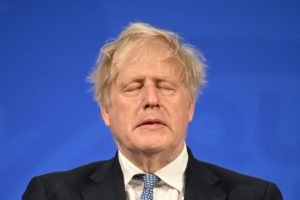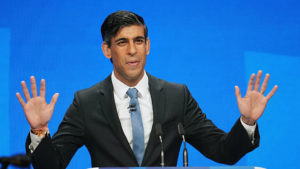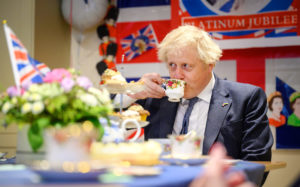Since the fall of Boris Johnson as leader of the Conservative Party, the aftershocks of dismay about his integrity continue to ripple, as his potential successors jostle for attention. But beneath these surface concerns, a more challenging struggle has been building. This is the battle for the soul of the Conservative Party.
The contest had already started before Pinchergate and Partygate. It was apparent in the disputes about the ending of pandemic lockdowns. Back then, the paternalism of some was at odds with the libertarianism of others. The policy differences reflected even deeper philosophical divisions, not least over how to approach the economy. These ultimately surfaced in different approaches to inflation, with rival positions staked out by Boris Johnson and Rishi Sunak.
Given the nature of the conflicts within the party what does it mean for the future of Conservatism? Johnson marked a new direction of travel, marrying a brand of patriotism boosted by Brexit with a redistributive economic policy. His rhetoric of “levelling up” indicated the way forward, implicitly abandoning Tory principles that had been in place since Margaret Thatcher. A party of low tax, low inflation, a small state and fiscal rectitude yielded to a programme of enhanced equality, public spending, and government investment in infrastructure.
These commitments, however, did seem to be nominal rather than substantial. Yes, taxation levels in the UK are headed for an all-time high since the Forties, but much of this reflects the costs incurred by the pandemic and anticipated damage from the stand-off with Russia. The same applies, in general, to levels of borrowing and spending. Under Johnson, though, there was no clear plan for future investment in public services, and little coherent thinking about the means of levelling up. Instead, there were promises, gestures and a plethora of slogans.
Slogans do matter, though. A fresh slogan licenses a new agenda, even if substantial change is endlessly deferred. And the reality of regional inequality in the United Kingdom is such that it will continue to fuel demands for targeted redistribution. Such calls generate wider pleas for social equality. In turn, this marks a potential long-term shift in the posture of Conservative politics. The idea that low tax will deliver growth, and with that an expansion of economic opportunities, is being challenged by complaints about persistent disadvantage. The old ideal of a rising tide of prosperity for all will have to respond to ongoing appeals for a baseline of equality.
As a result, Conservatism has changed tack. But this is not only because a new slogan has gained traction: the composition of the Conservative vote has also altered. Most obviously, going into future electoral campaigns, the Party cannot ignore the importance of the Red Wall. At least in the short term, Bolsover, Sedgefield and Bishop Auckland will be a factor in Conservative policy calculations if they want to win the next election. Having passed to the Conservatives in 2019, the Party will have to work to keep them from Labour the next time around.
Johnson, then, while not representing seismic transformation, does offer lessons in understanding non-revolutionary change. Modern parties are institutional as well as ideological entities. Their persistence over time suggests an element of durability. But the longevity of the Conservative Party is also a product of its adaptability. However, its constant flexibility is masked by appeals to the past, especially to ideas associated with classic thinkers.
There is nothing exceptional about Johnson’s deviation from Tory orthodoxy; the history of conservatism is a succession of deviations. The Conservative Party is not an enduring institutional edifice. Behind the image of a timeless corporate identity lies the reality of endless incremental adjustments. Equally, there are no conservative principles which have retained their integrity through the ages. Instead, apparently similar doctrines changed their meanings as circumstances evolved.
Even the origins of conservative principles are contested. The etymology of the word Tory stretches deep into the 17th century. It originally referred to Irish miscreants and was later associated with Papist rebels more generally. Given this miscellaneous background, a significant number of historians trace the beginnings of the Conservative Party to English monarchists who defended the rights of James II when his title to rule was challenged by the Whigs in the 1680s. Yet for many, since the Tories made their peace with the Glorious Revolution, the roots of the Conservative Party are better traced to the era of Viscount Bolingbroke in the early 18th century.
However, when Bolingbroke’s campaign against Walpole’s Whigs was flourishing in the 1720s and 1730s, Toryism was more a set of ideals than an organised party structure. The Tories attracted a following, but they lacked the means of enforcing discipline. Moreover, their main advocate was associated with bottomless hypocrisy. Having supported the Jacobite Rebellion in 1715, Bolingbroke came to seek reforms under the Hanoverian regime by mobilising one-time Whiggish ideas. Equally, he rallied in public to the defence of High Church Anglicanism while circulating in private his freethinking opinions.
Given Bolingbroke’s wayward character, and his apparently boundless opportunism, the sources of conservative principles are more often traced to Edmund Burke. There is no shortage of Tory publicists since the final decades of the 19th century keen to point to Burke as their primordial inspiration. In fact, by the Fifties, in the United States no less than the United Kingdom, the Irish statesman became a staple of Cold War conservatism in general.
Yet there has always been something odd about this deliberate appropriation. To begin with, throughout his political life, Burke was affiliated with the Whigs and not the Tories. Specifically, he was a partisan of the Rockingham Whigs from 1765 to 1782, and from then until the French Revolution he was closely allied with Charles James Fox.
Despite this, it seems that Burke, of all people, is most easily identified with modern conservatism because of his avowed hostility to the French Revolution. In the popular imagination, the events of 1789 mark the start of Left-wing politics. Burke, as a dogged critic of the new regime in France, is habitually branded as an adversary of all reform. Accordingly, he is painted as an opponent of the forces of progress and categorised as the high priest of tradition.
But given the erratic course of the Revolution, adopting it as a benchmark for right thinking is surely misguided.
In any case, it is inevitably distorting to view Burke’s career exclusively through the lens of the French Revolution. To begin with, his years as a Member of Parliament were largely spent in opposition and devoted to a vast array of reform measures. He was an avid defender of religious toleration, an opponent of increases in ministerial power under the crown, the foe of profiteering by the East India Company in South Asia, and a proponent of the rights of the American colonists against parliament. This last included support for their resort to arms against the British government. In fact, down to the last, Burke endorsed the general right of revolution against the state.
It is hard, then, to find in Burkean principles the origins of conservatism. Nonetheless, decontextualised precepts extracted from his writings are frequently deployed to guide conservative thinking. There is nothing peculiarly problematic about this procedure. It is a standard means of conferring an appearance of antiquity on new ideas. By these means, notably different undertakings can be absorbed into the semblance of a tradition. This is an inevitable part of the process of political change. Parties are most securely renewed by girding themselves with reassuring antecedents. Sober analysts, however, do not have to fall for the trick.
The current contest for the leadership of the Conservative Party is already being conducted in the language of Thatcherism, with candidates campaigning for a low-tax economy and advertising the virtues of a patriotic Brexit. This is because, most immediately, they need to appeal to the Party membership. But the new leader will then have to reanimate the ghost of Benjamin Disraeli since success at a general election will need an injection of one-nation Toryism. Disraeli’s “Tory Democracy” won new constituencies for the Conservatives, and Johnson’s successor will likewise have to appeal beyond the dependable cohort of southern middle class voters. For this reason, the north midlands and northern England cannot be taken for granted. Once again, the Johnsonian ability to expand the Tory electorate will continue to impose a challenge on his successors.
In examining this process, the student of politics ought not to conduct themselves like political contenders or party managers, concerned with pedigree instead of the actual course of history. We should not be captivated by the mantras of Left and Right, or the slogans of Conservatism and Labourism. Parties try to orient their followers by brandishing jingles. Every healthy democracy will inevitably draw upon such stratagems. But there also needs to be space for sober reflection in which we are able to call the prevailing trademarks into doubt. Political pundits too often pander to the rallying cries of politicians. Serious commentary should stand back from this daily froth and aim for a subtler appreciation of the real forces in play.
Disclaimer
Some of the posts we share are controversial and we do not necessarily agree with them in the whole extend. Sometimes we agree with the content or part of it but we do not agree with the narration or language. Nevertheless we find them somehow interesting, valuable and/or informative or we share them, because we strongly believe in freedom of speech, free press and journalism. We strongly encourage you to have a critical approach to all the content, do your own research and analysis to build your own opinion.
We would be glad to have your feedback.
Source: UnHerd Read the original article here: https://unherd.com





